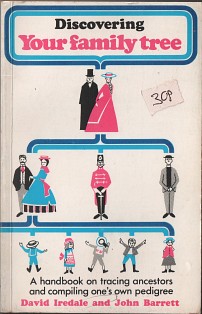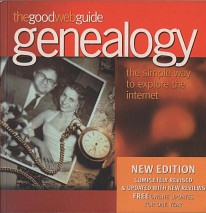Reviews by Subject:-
Movies, TV, DVDs, CDs, Critics | Jews, Christians, Moslems | Race |
Women
Reviews by Author:- Richard Dawkins | Martin Gardner ('Skeptic') | Bertrand Russell

David Iredale & John Barrett. First published 1970. 4th edn 1985. Contents list has 16 types of source.

2002, first printed 2000.
Genealogies, Family Trees, Internet, Mass Population Movements.
Rae West v. 1 Mar 2021
Newspaper Libraries
My own experience was with the Hendon Newspaper Library, a splendid building in Colindale, north London, which I mentally docketed as Victorian, with a reading-room or rooms, and wooden trolleys moving newpapers which were bound together in movable chunks. Coachloads of people arrived from parts of Britain, wanting to investigate their own family histories in births, marriages, and deaths columns. (I was for example in 1990-something looking up debates between Bertrand Russell and J M Keynes).
The British Library's site tells me that building closed Friday 8 November 2013. The newspapers and magazines (750 million pages) are to be moved north to Boston spa, and made accessible in London St Pancras by 'microfilm or digital copies', though I'd guess digitised versions will be prioritised.
David Ireland and John Barrow [right] give a handy list of the sources they describe:
2 Public libraries and other institutions
3 The record office
4 Family stories
5 Family papers
6 Civil registers
7 Censuses
8 Parish records
9 Wills
10 Justice of the peace [sic]
11 Estate muniments
12 Local government
13 Parliament
14 The public records
About 15 pages of books, addresses of depositories, county records and archives, etc.
Internet arrives [right]
With a long list of sites, perhaps expanded from previous books, this particular book makes special mention of genuki.org.uk ('the most important website of general use to UK researchers ... a 'virtual reference library') and the 'Mormon Index' at familysearch.com, compiled by the 'Church of Latter-Day Saints' in Utah, propelled by the idea of posthumous baptisms. Another site is booth.lse.ac.uk Charles Booth's survey of London life before the First World War; the LSE is of course Jewish, and its no surprise to find plenty of mention of prostitutes, and no mention of Jewish crooks. I looked for Burke's Peerage, but this seems to be missing. There is a site called worldroots.com ('the royalty pages') with information about European Royalty.
All this of course is where the fun starts. Burke's Peerage was notorious for using layout designed to conceal Jewish roots. Sites on single surnames may not include name-changers. Sites based in seacoast towns and the Celtic fringes offer plenty of scope for people with odd voices to masquerade as Scots, Welsh, Irish, or farther afield. People keen to hide their ancestry may have ancestors who are removed from lists or unmentioned. I'd expect many of the operators at Bletchley Park to have been Jews. And ditto for Caversham Park, the BBC listening station. There are sites (such as Avotaynu) claiming to list Jewish surnames. The Official Gazette had some material on official changers of names, but it's hard to believe that it came anywhere near to fully recording illegal immigrants.
By 2020, there were TV programs on 'your roots', 'tracing DNA' and so on, so that Jews from Russia or Hungary or wherever can be shown having their supposed roots traced. (I watched a British TV detective thing, McDonald and Dodds, old white male detective, mixed-race female sidekick, four or five old media friends, and a technical chap being unimpressive, but technically skilled. The entire plot revolved around stereotypes, and presumed Jews working a property fake, involving squatters—it hadn't occurred to me that the squatting movement may have been directed by Jewish lawyers).
Another unmentionable issue is highly-placed military, civil service, education people, concerned about their pensions in the way such people used to be concerned with their investments, as per Keynes in the 1930s. The Public Record Office (near Kew) has whole book, files and papers on special searches: I have in front of me Using Army Records. It can hardly be expected that complete records would exist for deserters, people who didn't want to be killed, spies, medical treatment for homosexual officers, and many other categories.
I think probably the most important details missing would be on the money side of things, which would evidence what most people would regard as treachery.
It may be that DNA analysis may make pinpointing ancestors a precise science. I have little faith in modern scientists, but things may change. I don't know whether inherited DNA has genes which may separate into single parts of evidence; maybe.
Meanwhile, I urge people to look at Miles Mathis' historical material, which shows how skilful use of free records may be a key 21st century revisionist tool.
©Rae West 2 March 2021
Scanning, selection, HTML by Rae West.